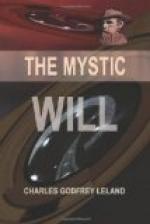Now to advance what seems a paradox, it is evident that even what we regard as inspired genius comes to man in a great measure from Instinct, though as I noted before it is aided by reflection. As the young bird listens to its mother and then sings till as a grown nightingale it pours forth a rich flood of varying melody; so the poet or musician follows masters and models, and then, like them, creates, often progressing, but is never entirely spontaneous or original. When the artist thinks too little he lacks sense, when he thinks too much he loses fire. In the very highest and most strangely mysterious poetical flights of SHELLEY and KEATS, or WORDSWORTH, I find the very same Instinct which inspires the skylark and nightingale, but more or less allied to and strengthened by Thought or Consciousness. If human Will or Wisdom alone directed all our work, then every man who had mere patience might be a great original genius, and it is indeed true that Man can do inconceivably more in following and imitating genius than has ever been imagined. However, thus far the talent which enables a man to write such a passage as that of TENNYSON,
“The tides of Music’s
golden sea
Setting towards Eternity,”
results from a development of Instinct, or an intuitive perception of the Beautiful, such as Wordsworth believed existed in all things which enjoy sunshine, life, and air. The poet himself cannot explain the processes, though he may be able to analyze in detail how or why he made or found a thousand other things.
It is not only true that Genius originates in something antecedent to conscious reflection or intellect, but also that men have produced marvelous works of art almost without knowing it, while others have shown the greatest incapacity to do so after they had developed an incredible amount of knowledge. Thus Mr. WHISTLER reminded RUSKIN that when the world had its greatest artists, there were no critics.
And it is well to remember that while the Greeks in all their glory of Art and Poetry were unquestionably rational or consciously intelligent, there was not among them the thousandth part of the anxious worrying, the sentimental self-seeking and examination, or the Introversion which worms itself in and out of, and through and through, all modern work, action and thought, even as mercury in an air-pump will permeate the hardest wood. For the Greeks worked more in the spirit of Instinct; that is, more according to certain transmitted laws and ideas than we realize—albeit this tradition was of a very high order. We have lost Art because we have not developed tradition, but have immensely increased consciousness, or reflection, out of proportion to art It was from India and Egypt in a positive form that Man drew the poison of sentimental Egoism which became comparative in the Middle Ages and superlative in this our time.




